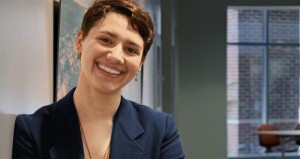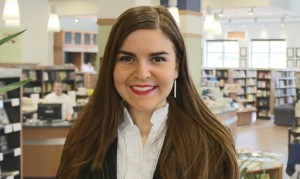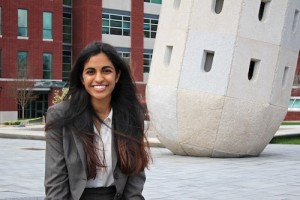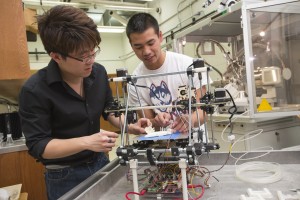Interested in spending the summer engaged in an exciting research project? There is still time to apply for summer research opportunities in a variety of areas. The programs and opportunities listed below are still accepting applications.
State University of New York Upstate Medical University – Summer Undergraduate Research Fellowship (SURF) Program
Deadline: February 16, 2015
http://www.upstate.edu/grad/programs/summer.php
This 10-week summer research program is for students majoring in chemistry, biology, or a related field. Applicants should be between their junior and senior years (in Summer 2015) and have a strong interest in pursuing a Ph.D. in biomedical research. $3,000 stipend and housing provided.
American Heart Assocation, Founders Affiliate Undergraduate Student Summer Fellowship Program
Deadline: February 19, 2015
http://www.heart.org/HEARTORG/Affiliate/Founders-Affiliate-Local-Research-Opportunities_UCM_315885_Article.jsp
This program encourages students to pursue careers in cardiovascular research. Projects related to cardiovascular biology and stroke will be considered. $5,000 fellowship. Student is expected to identify a sponsor with a research laboratory within the Founders Affiliate.
Maryland Sea Grant REU Program
Deadline: February 20, 2015
http://www.mdsg.umd.edu/topics/research-experiences-undergraduates/research-experiences-undergraduates
Fifteen students are selected to conduct marine research on the Chesapeake Bay at one of two University of Maryland Center for Environmental Sciences laboratories. The program is designed for students majoring in marine science, ecology, environmental science, biology, and chemistry. $6,000 stipend and housing provided.
NOAA Chesapeake Bay Office – Summer Internships
Deadline: February 20, 2015
http://chesapeakebay.noaa.gov/student-opportunities/chesapeake-bay-internships
Paid undergraduate internships available for Summer 2015. Descriptions of available internships can be found at the above link.
Research Fellowships in Oceanography at University of Rhode Island
Deadline: February 21, 2015
http://surfo.gso.uri.edu/~surfo/index.html
The Summer Undergraduate Research Fellowships in Oceanography program is a 10-week research experience designed for science, math, and engineering students who will be seniors in Fall 2015. Stipend of approximately $5,500.
Multicultural Academic Opportunities Program (MCOP) Undergraduate Summer Research Internship, Virginia Tech
Deadline: February 27, 2015
http://www.maop.vt.edu/Undergraduate_programs/summer_research.html
Wide variety of academic disciplines; $3,000 stipend, free on-campus room and board.
Summer Premedical Academic Enrichment Program at the University of Pittsburgh School of Medicine
Deadline: February 27, 2015
http://www.medschool.pitt.edu/spaep/application/
Summer research program that pairs rising juniors and seniors with biomedical researchers in a variety of areas. $1,000 stipend, room and board included, and travel assistance provided.
Marine Physical Laboratory Internships at the Scripps Institution of Oceanography
Deadline: February 27, 2015
http://www.mpl.ucsd.edu/news/mpl.internships.html
10-week summer research internship in marine science and technology; $14/hour compensation.
Center for Security Printing & Anti-Counterfeiting Technology (SPACT) NSF Research Experience for Undergraduates
Deadline: February 27, 2015
http://spact-center.org/reu/
This 10-week, NSF sponsored, REU program provides students with the opportunity to conduct research on security printing and anti-counterfeiting technology. Research opportunities in Materials Science and Engineering, Materials Chemistry, Electrical/Computer Engineering, and Computer Science. $5,000 stipend and housing provided.
National Institutes of Health – Summer Internship Program in Biomedical Research
Deadline: March 1, 2015
https://www.training.nih.gov/programs/sip
The National Institutes of Health (NIH) internship program provides students with an opportunity to work side-by-side with scientists in an environment devoted exclusively to biomedical research. This is a highly competitive program.
Bigelow Laboratory of Ocean Sciences REU Program: Gulf of Maine and the World Ocean
Deadline: March 1, 2015
http://www.bigelow.org/education/reu/
This highly competitive, 10-week REU program pairs students with scientist mentors for a hands-on, independent research experience. Housing and $5,000 stipend provided.
Center for Visual Science – Summer Research Fellowship Program, University of Rochester
Deadline: March 1, 2015
http://www.cvs.rochester.edu/training/undergraduate/fellowships/index.html
Students who are juniors (during 2014-15) with an interest in neuroscience, cognitive science, and biomedical science are encouraged to apply for this summer of supervised laboratory training. $3,600 stipend and on-campus housing provided.
Ecology and Evolution in Changing Environments: Mechanisms to Responses – Kansas State University Biology REU Program
Deadline: March 1, 2015
http://www.k-state.edu/reu/REU/index.html
This 10-week program provides undergraduates interested in biological sciences with research experience and professional development under the mentorship of a faculty mentor. $5,000 stipend and housing provided.
Summer Undergraduate Research Program at the University of Pittsburgh School of Medicine
Deadline: March 1, 2015
http://www.gradbiomed.pitt.edu/node/268
10-week research experience, with research mentors from Cell Biology, Cellular and Molecular Pathology, Immunology, Molecular Biophysics and Structural Biology, Molecular Genetics and Developmental Biology, Molecular Pharmacology, and Molecular Virology and Microbiology. Stipend of $3,500; additional funding for housing and travel may also be available.
Nanotechnology for Health, Energy and the Environment – University of Stony Brook
Deadline: March 13, 2015
http://www.stonybrook.edu/commcms/reu/index.html
The summer research experience is for talented undergraduates who are interested in the nanotechnology field. $4,000 stipend, free housing and a meal plan.
Unite for Sight’s Global Impact Corps
Deadline: Rolling, for short term and long term trips throughout the year
http://www.uniteforsight.org/volunteer-abroad
This volunteer abroad opportunity offers a global health experience for students interested in public health, international development, medicine, or social entrepreneurship. Global Impact Fellows may elect to participate in the Global Impact Lab research program. Current projects include research studies about medication management, the use of visual resources for patient education, traditional medicine practices, and patient barriers to eye care.
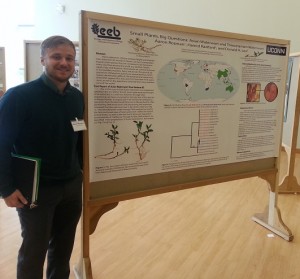 Aaron Rosman ’16 (CAHNR) is a member of the second cohort of UConn IDEA Grant recipients. Aaron’s research focuses on clarifying the species boundaries between different kinds of waterwort, or Elatine, considered invasive species in many countries. Through DNA sequencing, Aaron and his advisors determined that Elatine ambigua Wight (Asian waterwort) and Elatine triandra Schkuhr (threestamen waterwort) are indeed distinct species. Further, they documented the first confirmed case of E. ambigua in the United States outside of California.
Aaron Rosman ’16 (CAHNR) is a member of the second cohort of UConn IDEA Grant recipients. Aaron’s research focuses on clarifying the species boundaries between different kinds of waterwort, or Elatine, considered invasive species in many countries. Through DNA sequencing, Aaron and his advisors determined that Elatine ambigua Wight (Asian waterwort) and Elatine triandra Schkuhr (threestamen waterwort) are indeed distinct species. Further, they documented the first confirmed case of E. ambigua in the United States outside of California.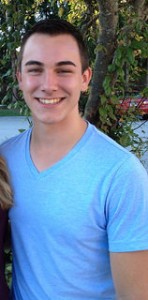 Chris Kegler ’15 (CAHNR, CLAS) received a donor-funded
Chris Kegler ’15 (CAHNR, CLAS) received a donor-funded 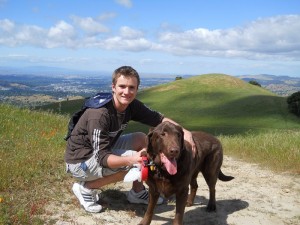
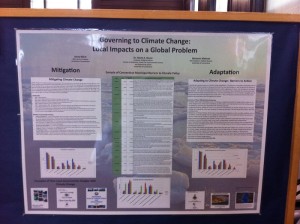
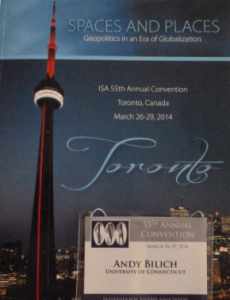
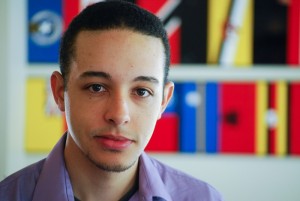 Carl D’Oleo-Lundgren ’14 (CLAS), an individualized major in international relations, aspires to earn a master’s degree and join the Foreign Service. As part of his undergraduate studies, Carl collaborated on a
Carl D’Oleo-Lundgren ’14 (CLAS), an individualized major in international relations, aspires to earn a master’s degree and join the Foreign Service. As part of his undergraduate studies, Carl collaborated on a 